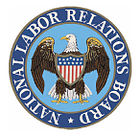NLRB
| NLRB | |
 |
|
| Agency overview | |
|---|---|
| Formed | July 5, 1935 |
| Preceding agencies |
|
| Jurisdiction | Federal government of the United States |
| Headquarters | Washington, D.C. |
| Employees | 1,628 (2008) |
| Agency executives |
|
| Parent agency | Executive Office of the President |
| Website | nlrb.gov |
The National Labor Relations Board (NLRB) is an independent US government agency with responsibilities for enforcing US labor law in relation to collective bargaining and unfair labor practices. Under the National Labor Relations Act of 1935 it supervises elections for labor union representation and can investigate and remedy unfair labor practices. Unfair labor practices may involve union-related situations or instances of protected concerted activity. The NLRB is governed by a five-person board and a General Counsel, all of whom are appointed by the President with the consent of the Senate. Board members are appointed to five-year terms and the General Counsel is appointed to a four-year term. The General Counsel acts as a prosecutor and the Board acts as an appellate judicial body from decisions of administrative law judges.
The NLRB is headquartered at 1015 Half St. SE, Washington, D.C., with over 30 regional, sub-regional, and residential offices throughout the U.S.
The history of the National Labor Relations Board (NLRB) can be traced to enactment of the National Industrial Recovery Act in 1933. Section 7(a) of the act protected collective bargaining rights for unions, but implementation proved immensely problematic as a massive wave of union organizing punctuated by employer and union violence, general strikes, and recognition strikes occurred. The National Industrial Recovery Act was administered by the National Recovery Administration (NRA). At the outset, NRA Administrator Hugh S. Johnson naïvely believed that Section 7(a) would be self-enforcing, but the tremendous labor unrest proved him wrong. On August 5, 1933, President Franklin D. Roosevelt announced the establishment of the National Labor Board under the auspices of the NRA to implement the collective bargaining provisions of Section 7(a).
...
Wikipedia
